Deck 16: Computed Tomography of the Body
Question
Question
Question
Question
Question
Question
Question
Question
Question
Question
Question
Question
Question
Question
Question
Question
Question
Question
Question
Question
Question
Question
Question
Question
Question
Question
Question
Question
Question
Question
Question
Question
Question
Question
Question
Question
Question
Question
Question
Question
Question
Question
Question
Question
Question

Unlock Deck
Sign up to unlock the cards in this deck!
Unlock Deck
Unlock Deck
1/45
Play
Full screen (f)
Deck 16: Computed Tomography of the Body
1
In CT, preoperative assessments of abdominal aortic aneurysms are performed for all of the following reasons except:
A) assess the iliac arteries.
B) determine the relationship between the aneurysm and the renal arteries.
C) determine surgery time.
D) precisely size the entire aneurysm.
A) assess the iliac arteries.
B) determine the relationship between the aneurysm and the renal arteries.
C) determine surgery time.
D) precisely size the entire aneurysm.
determine surgery time.
2
A triphase study of the liver includes all of the following except:
A) arterial phase.
B) delayed phase.
C) preinjection phase.
D) venous phase.
A) arterial phase.
B) delayed phase.
C) preinjection phase.
D) venous phase.
preinjection phase.
3
Computed tomographic imaging of the adrenal glands is easy and reliable, except when the patient is extremely _________.
A) dehydrated
B) obese
C) thin
D) young
A) dehydrated
B) obese
C) thin
D) young
thin
4
In patients with known or suspected bronchogenic carcinoma, computed tomography (CT) is used to determine the extent of invasion to all of the following except:
A) chest wall.
B) diaphragm.
C) mediastinum.
D) lymph nodes.
A) chest wall.
B) diaphragm.
C) mediastinum.
D) lymph nodes.

Unlock Deck
Unlock for access to all 45 flashcards in this deck.
Unlock Deck
k this deck
5
In a trauma study of the liver, all of the following conditions can be demonstrated except:
A) active hemorrhage.
B) hematoma.
C) hemothorax.
D) lacerations.
A) active hemorrhage.
B) hematoma.
C) hemothorax.
D) lacerations.

Unlock Deck
Unlock for access to all 45 flashcards in this deck.
Unlock Deck
k this deck
6
Computed tomographic imaging of the bowel for evaluation of bowel obstructions can demonstrate all of the following except:
A) confirmation of obstruction.
B) determination of the level of obstruction.
C) measurement of bowel fluid.
D) indication of possible vascular compromise.
A) confirmation of obstruction.
B) determination of the level of obstruction.
C) measurement of bowel fluid.
D) indication of possible vascular compromise.

Unlock Deck
Unlock for access to all 45 flashcards in this deck.
Unlock Deck
k this deck
7
The ascending aorta is labeled: 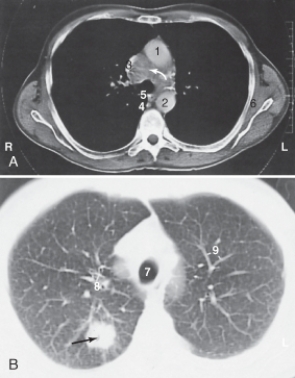
A)1.
B)2.
C)5.
D)7.

A)1.
B)2.
C)5.
D)7.

Unlock Deck
Unlock for access to all 45 flashcards in this deck.
Unlock Deck
k this deck
8
What is the most common indication for splenic imaging?
A) Arterial stenosis
B) Carcinomas
C) Lymphoma
D) Trauma
A) Arterial stenosis
B) Carcinomas
C) Lymphoma
D) Trauma

Unlock Deck
Unlock for access to all 45 flashcards in this deck.
Unlock Deck
k this deck
9
Abdomen and pelvis scans are commonly obtained with the patient in a _________ position.
A) left lateral
B) right lateral
C) prone
D) supine
A) left lateral
B) right lateral
C) prone
D) supine

Unlock Deck
Unlock for access to all 45 flashcards in this deck.
Unlock Deck
k this deck
10
The introduction of___________ enhanced the capability of determining the exact location of needle placement.
A) computed tomographic angiography
B) computed tomographic fluoroscopy
C) computed tomographic screening
D) quantitative CT
A) computed tomographic angiography
B) computed tomographic fluoroscopy
C) computed tomographic screening
D) quantitative CT

Unlock Deck
Unlock for access to all 45 flashcards in this deck.
Unlock Deck
k this deck
11
Coronary artery studies present each of these challenges during computed tomographic angiography except:
A) pronounced rapid motion.
B) small size.
C) tortuous course.
D) invasive nature of acquiring images.
A) pronounced rapid motion.
B) small size.
C) tortuous course.
D) invasive nature of acquiring images.

Unlock Deck
Unlock for access to all 45 flashcards in this deck.
Unlock Deck
k this deck
12
Patients with diverticulitis will usually feel pain in the:
A) right upper quadrant.
B) right lower quadrant.
C) left upper quadrant.
D) left lower quadrant.
A) right upper quadrant.
B) right lower quadrant.
C) left upper quadrant.
D) left lower quadrant.

Unlock Deck
Unlock for access to all 45 flashcards in this deck.
Unlock Deck
k this deck
13
What classification of chest CT can best diagnose conditions such as pulmonary lacerations, hemothorax, and pneumothorax?
A) HRCT
B) Lung CT
C) Screening CT
D) Trauma CT
A) HRCT
B) Lung CT
C) Screening CT
D) Trauma CT

Unlock Deck
Unlock for access to all 45 flashcards in this deck.
Unlock Deck
k this deck
14
Computed tomographic imaging of bony tumors is useful in determining all of the following except:
A) articular involvement.
B) evaluating cortical integrity.
C) measuring bone strength.
D) tumor location in the bone.
A) articular involvement.
B) evaluating cortical integrity.
C) measuring bone strength.
D) tumor location in the bone.

Unlock Deck
Unlock for access to all 45 flashcards in this deck.
Unlock Deck
k this deck
15
High-resolution CT (HRCT) is effective in evaluating all of the following except:
A) asbestosis.
B) dissecting aneurysm.
C) idiopathic pulmonary fibrosis.
D) silicosis.
A) asbestosis.
B) dissecting aneurysm.
C) idiopathic pulmonary fibrosis.
D) silicosis.

Unlock Deck
Unlock for access to all 45 flashcards in this deck.
Unlock Deck
k this deck
16
All of the following should be performed by the technologist before the examination except:
A) explain the examination to be performed.
B) explain the use of the contrast media.
C) have the patient empty the bladder.
D) summon the radiologist for the examination.
A) explain the examination to be performed.
B) explain the use of the contrast media.
C) have the patient empty the bladder.
D) summon the radiologist for the examination.

Unlock Deck
Unlock for access to all 45 flashcards in this deck.
Unlock Deck
k this deck
17
What is the digital localizing radiograph that usually begins a computed tomographic?
A) View
B) Histograph
C) Topogram
D) Projection
A) View
B) Histograph
C) Topogram
D) Projection

Unlock Deck
Unlock for access to all 45 flashcards in this deck.
Unlock Deck
k this deck
18
Computed tomographic imaging of skeletal trauma includes anatomical regions of the:
A) ankle.
B) pelvis.
C) shoulder.
D) spine.
A) ankle.
B) pelvis.
C) shoulder.
D) spine.

Unlock Deck
Unlock for access to all 45 flashcards in this deck.
Unlock Deck
k this deck
19
In the evaluation of renal calculi, advantages of a noncontrast CT over a conventional intravenous (IV) pyelogram include each of the following except:
A) reduction of radiation dose.
B) delineation of signs associated with obstruction.
C) determination of stone size.
D) determination of stone location.
A) reduction of radiation dose.
B) delineation of signs associated with obstruction.
C) determination of stone size.
D) determination of stone location.

Unlock Deck
Unlock for access to all 45 flashcards in this deck.
Unlock Deck
k this deck
20
CT of the lungs is useful in diagnosing the following abnormalities except:
A) granulomas.
B) lymphangitic carcinomas
C) pleurisy.
D) pulmonary embolism.
A) granulomas.
B) lymphangitic carcinomas
C) pleurisy.
D) pulmonary embolism.

Unlock Deck
Unlock for access to all 45 flashcards in this deck.
Unlock Deck
k this deck
21
The psoas muscle is labeled: 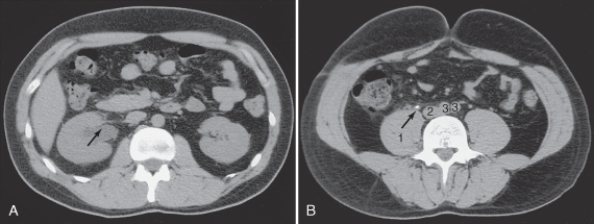
A)1.
B)2
C)3.
D)4.

A)1.
B)2
C)3.
D)4.

Unlock Deck
Unlock for access to all 45 flashcards in this deck.
Unlock Deck
k this deck
22
The adrenal glands are labeled: 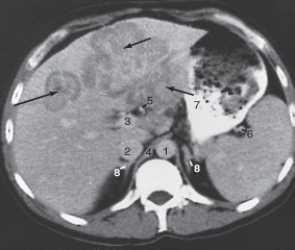
A)3.
B)4.
C)5.
D)8.

A)3.
B)4.
C)5.
D)8.

Unlock Deck
Unlock for access to all 45 flashcards in this deck.
Unlock Deck
k this deck
23
The purpose of oral contrast agents is to opacify the gastrointestinal (GI) tract.

Unlock Deck
Unlock for access to all 45 flashcards in this deck.
Unlock Deck
k this deck
24
MRI demonstrates the pancreas better than CT does.

Unlock Deck
Unlock for access to all 45 flashcards in this deck.
Unlock Deck
k this deck
25
The structure labeled as 2 is the: 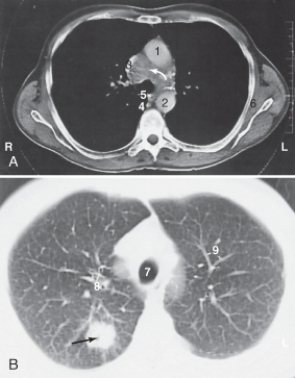
A) ascending aorta.
B) descending aorta.
C) esophagus.
D) superior vena cava.

A) ascending aorta.
B) descending aorta.
C) esophagus.
D) superior vena cava.

Unlock Deck
Unlock for access to all 45 flashcards in this deck.
Unlock Deck
k this deck
26
The structure labeled as 2 is the: 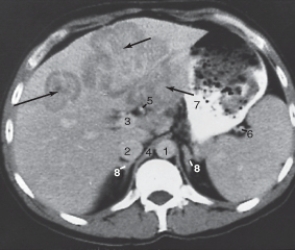
A) aorta.
B) hepatic artery.
C) inferior vena cava (IVC).
D) portal vein.

A) aorta.
B) hepatic artery.
C) inferior vena cava (IVC).
D) portal vein.

Unlock Deck
Unlock for access to all 45 flashcards in this deck.
Unlock Deck
k this deck
27
Cardiac computed tomographic imaging has not proved successful in the evaluation of the coronary arteries.

Unlock Deck
Unlock for access to all 45 flashcards in this deck.
Unlock Deck
k this deck
28
The duodenum is labeled: 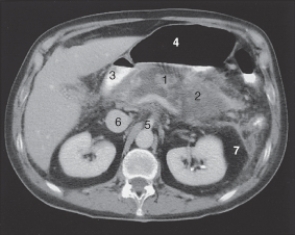
A)1.
B)2.
C)3.
D)4.

A)1.
B)2.
C)3.
D)4.

Unlock Deck
Unlock for access to all 45 flashcards in this deck.
Unlock Deck
k this deck
29
The trachea is labeled: 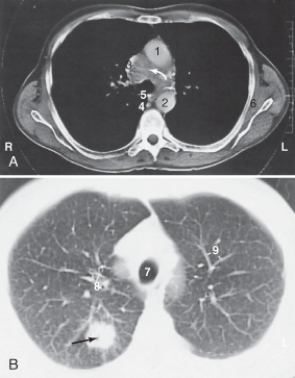
A)1.
B)2.
C)4.
D)7.

A)1.
B)2.
C)4.
D)7.

Unlock Deck
Unlock for access to all 45 flashcards in this deck.
Unlock Deck
k this deck
30
HRCT is more sensitive than chest radiography for the detection of emphysema.

Unlock Deck
Unlock for access to all 45 flashcards in this deck.
Unlock Deck
k this deck
31
CT is the primary method for pelvic assessment.

Unlock Deck
Unlock for access to all 45 flashcards in this deck.
Unlock Deck
k this deck
32
The structure labeled as 3 is the: 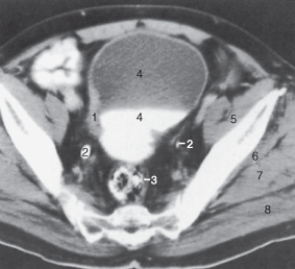
A) anus.
B) sigmoid colon.
C) cecum.
D) duodenum.

A) anus.
B) sigmoid colon.
C) cecum.
D) duodenum.

Unlock Deck
Unlock for access to all 45 flashcards in this deck.
Unlock Deck
k this deck
33
CT is better than ultrasonography in determining intrahepatic and extrahepatic bile ducts in jaundiced patients.

Unlock Deck
Unlock for access to all 45 flashcards in this deck.
Unlock Deck
k this deck
34
An indication for computed tomographic scanning of the chest is lymphadenopathy in patients with suspected bronchogenic carcinoma, lymphoma, or other malignancies.

Unlock Deck
Unlock for access to all 45 flashcards in this deck.
Unlock Deck
k this deck
35
Biphasic or triphasic examinations of the pancreas are helpful when searching for potential solid lesions.

Unlock Deck
Unlock for access to all 45 flashcards in this deck.
Unlock Deck
k this deck
36
CT is superior to magnetic resonance imaging (MRI) for most clinical indications of the chest and abdomen.

Unlock Deck
Unlock for access to all 45 flashcards in this deck.
Unlock Deck
k this deck
37
The superior mesenteric artery is labeled: 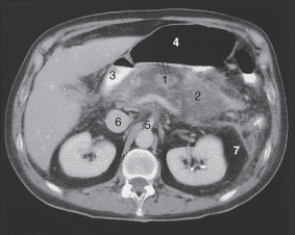
A)1.
B)2.
C)3.
D)4.

A)1.
B)2.
C)3.
D)4.

Unlock Deck
Unlock for access to all 45 flashcards in this deck.
Unlock Deck
k this deck
38
The aorta is labeled: 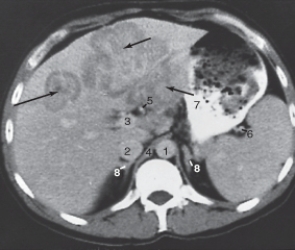
A)1.
B)2
C)3.
D)4.

A)1.
B)2
C)3.
D)4.

Unlock Deck
Unlock for access to all 45 flashcards in this deck.
Unlock Deck
k this deck
39
Proper use of IV contrast is not important for detecting masses in the liver.

Unlock Deck
Unlock for access to all 45 flashcards in this deck.
Unlock Deck
k this deck
40
The structure labeled as 2 is the: 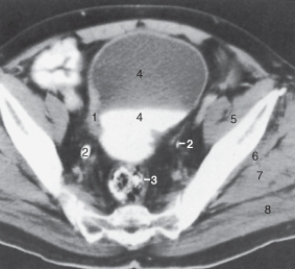
A) renal calculus.
B) iliac artery.
C) ureter.
D) iliac vein.

A) renal calculus.
B) iliac artery.
C) ureter.
D) iliac vein.

Unlock Deck
Unlock for access to all 45 flashcards in this deck.
Unlock Deck
k this deck
41
Please match the following Hounsfield units (HU) and fluids. Answer selections will be used only once.
1. 5-10 HU
2. 25-50 HU
3. 40-75 HU
4. 85-350 HU
40-75 HU
A)Clotted blood
B)Extravasated contrast
C)Ascites, bile, urine, or bowel contents
D)Unclotted blood
1. 5-10 HU
2. 25-50 HU
3. 40-75 HU
4. 85-350 HU
40-75 HU
A)Clotted blood
B)Extravasated contrast
C)Ascites, bile, urine, or bowel contents
D)Unclotted blood

Unlock Deck
Unlock for access to all 45 flashcards in this deck.
Unlock Deck
k this deck
42
If the patient has had a recent barium study, sufficient time should be allowed for elimination of the contrast medium.

Unlock Deck
Unlock for access to all 45 flashcards in this deck.
Unlock Deck
k this deck
43
Please match the following Hounsfield units (HU) and fluids. Answer selections will be used only once.
1. 5-10 HU
2. 25-50 HU
3. 40-75 HU
4. 85-350 HU
25-50 HU
A)Clotted blood
B)Extravasated contrast
C)Ascites, bile, urine, or bowel contents
D)Unclotted blood
1. 5-10 HU
2. 25-50 HU
3. 40-75 HU
4. 85-350 HU
25-50 HU
A)Clotted blood
B)Extravasated contrast
C)Ascites, bile, urine, or bowel contents
D)Unclotted blood

Unlock Deck
Unlock for access to all 45 flashcards in this deck.
Unlock Deck
k this deck
44
Please match the following Hounsfield units (HU) and fluids. Answer selections will be used only once.
1. 5-10 HU
2. 25-50 HU
3. 40-75 HU
4. 85-350 HU
85-350 HU
A)Clotted blood
B)Extravasated contrast
C)Ascites, bile, urine, or bowel contents
D)Unclotted blood
1. 5-10 HU
2. 25-50 HU
3. 40-75 HU
4. 85-350 HU
85-350 HU
A)Clotted blood
B)Extravasated contrast
C)Ascites, bile, urine, or bowel contents
D)Unclotted blood

Unlock Deck
Unlock for access to all 45 flashcards in this deck.
Unlock Deck
k this deck
45
Please match the following Hounsfield units (HU) and fluids. Answer selections will be used only once.
1. 5-10 HU
2. 25-50 HU
3. 40-75 HU
4. 85-350 HU
5-10 HU
A)Clotted blood
B)Extravasated contrast
C)Ascites, bile, urine, or bowel contents
D)Unclotted blood
1. 5-10 HU
2. 25-50 HU
3. 40-75 HU
4. 85-350 HU
5-10 HU
A)Clotted blood
B)Extravasated contrast
C)Ascites, bile, urine, or bowel contents
D)Unclotted blood

Unlock Deck
Unlock for access to all 45 flashcards in this deck.
Unlock Deck
k this deck


